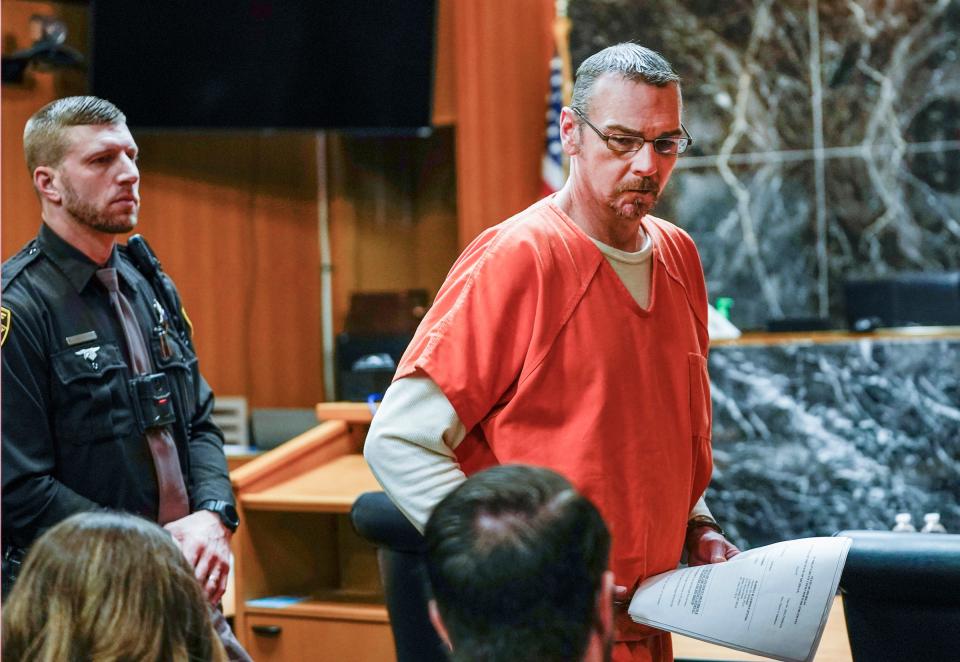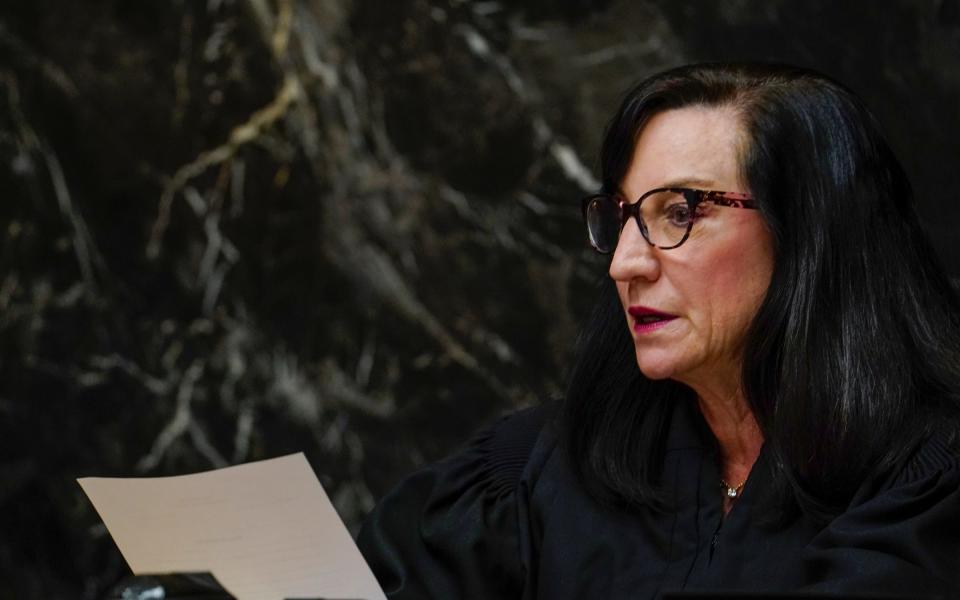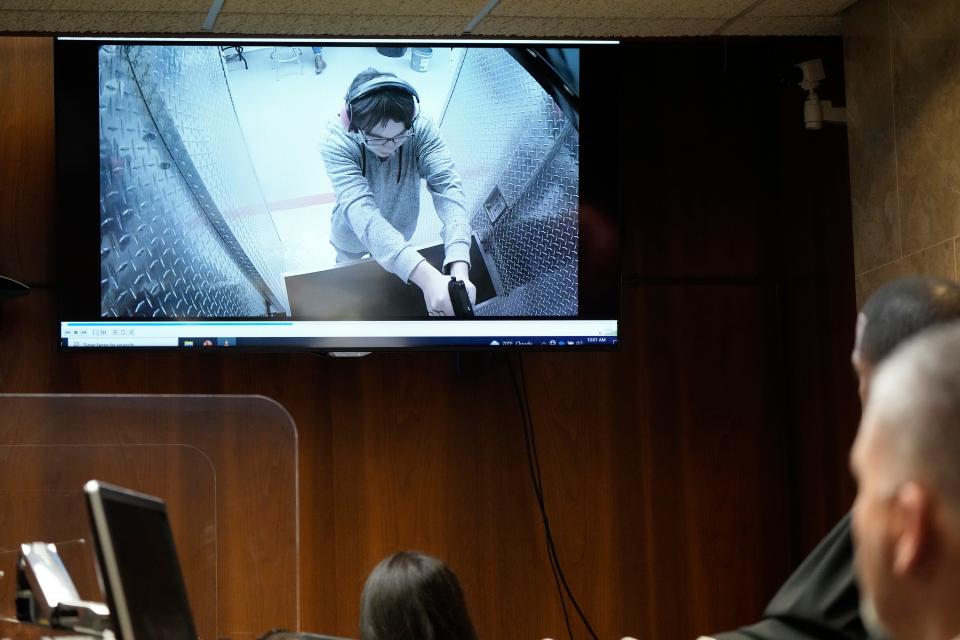Oxford shooter's journal may hold key to dad's fate. But will jury hear it?
The Oxford school shooter's journal could help decide the fate of his father — though the dad is concerned the jury will hear only excerpts that hurt him when he goes to trial next week over the deaths of four students murdered by his son.
At least one journal entry could help James Crumbley, who bought the gun that his son used in the 2021 massacre, but the judge may not let the jury hear it. The son also purportedly made comments to psychiatrists that could help his dad, but the jury may not hear that information, either.
Rather, James Crumbley is preparing to go trial next week in a case that his lawyer argues will unfairly give leverage to the prosecution, which plans to show the jury evidence that cannot be challenged, given that the shooter has refused to testify in his parents' involuntary manslaughter trials. Prosecutors intend to introduce journal entries and text messages that the shooter sent his friend alleging that his parents ignored his pleas for help with mental health problems.

At issue for James Crumbley is whether jurors will believe that he gifted his son a gun and gave him easy access to it, which the prosecution has maintained. Or will the jury conclude that the gun was only to be used at the shooting range with his dad, and properly secured, as the defense has maintained.
'I have to find where my dad hid my gun'
James Crumbley faces four counts of involuntary manslaughter, one for each student gunned down by his son at Oxford High School on Nov. 30, 2021. His wife, Jennifer Crumbley, was convicted early this month on identical charges, making her the first parent in America to be held criminally accountable for a school shooting. Their son, Ethan Crumbley, pleaded guilty to killing four and wounding seven, and is serving life in prison without the possibility of parole.
Those killed were Madisyn Baldwin, 17; Tate Myre, 16; Hana St. Juliana, 14, and Justin Shilling, 17.
The shooter's journal may help jurors decide the case. However, the defense is concerned that the jury will hear only this narrative from the journal: the shooter alleging he had "zero help" for his mental health problems, that his parents ignored those problems, and that it was causing him to "shoot up the f------school."
The Crumbleys have denied those allegations, along with claims that they gave their son easy access to a gun — a claim they maintain can be refuted by this passage in their son's journal: "I will have to find where my dad hid my gun before I can shoot (up) the school."
Defense attorneys see imbalance in journal entries allowed as evidence
That journal entry was not allowed to be used at the mother's trial. It may not get into the dad's trial, either, which has criminal defense experts crying foul, maintaining storage of the gun is at the heart of the dad's defense.
As veteran criminal defense attorney Art Weiss has argued: "If the gun was a gift, why did the parents have to hide it?"
"I don't know how that doesn't come in," Weiss said of the shooter's journal entry that he has to find where his dad hid the gun.
Moreover, Weiss stressed, he can't figure out why a jury would be allowed to hear that the shooter felt he was mentally troubled and ignored by his parents, but not that his dad hid the gun.
"I don't know why one is in, and why one is not," Weiss said.
Former federal prosecutor Michael Bullotta, who is now a criminal defense lawyer, also has issues with the journal and text messages being used against James Crumbley when he can't cross-examine the writer. He has maintained such evidence is hearsay, particularly a text the shooter sent to his friend alleging his dad told him to "suck it up" once when he asked him for medical help, and that his mom laughed at him.
"A statement of something that happened in the past — he told his parents he needed help and they laughed — is black letter law hearsay," Bullotta said.
Oakland County Circuit Court Judge Cheryl Matthews is expected to issue an opinion on the journal and text messages this week, possibly as early as Wednesday. Among the journal entries she has ruled as admissible are:
“I want help but my parents don’t listen to me so I can’t get any help.”
“I have zero help for my mental problems and it’s causing me to shoot up the f------ school."
"My parents won’t listen to me about help or a therapist.”
"These are all relevant to the shooter’s state of mind and thus admissible," Matthews ruled in 2022, concluding the texts and journal entries are "not unfairly prejudicial" and "highly probative."
The journal entries undoubtedly have James Crumbley on edge, given that the jury forewoman in his wife's case said that the journal "played a huge part" during deliberations.

Concerning texts that the shooter sent his friend in the spring of 2021, Matthews has held:
"Even though texts in April of 2021 are seven months before the shooting in November, they are highly probative of the people's allegations that the (parents) continually ignored the shooter's escalating … mental health issues."
Former federal prosecutor Mark Chutkow, who is now in private practice with the Detroit-based Dykema law firm, believes Matthews' decision to let in what he described as "damaging" texts and journal entries will survive legal scrutiny. He said her decision comes down to the fact that the things he was writing were references to things happening to him, right then while they were occurring, rather than relaying facts from long ago. He said courts tend to put more reliability on present reflections like that, because they seem less susceptible to manipulation by someone who, after the fact, tries to portray the world the way that benefits them, rather than the truth.
"While some courts might rule differently regarding some of this evidence, the Crumbleys likely will face an uphill battle convincing an appellate court that the judge abused her discretion in admitting the evidence," Chutkow said, adding: "I wouldn't expect the judge to substantially change her evidentiary rulings at the upcoming trial of James Crumbley because her justification for admitting most of the evidence will apply equally to the case against the father, too."
Prosecution: The journal and texts are relevant
The prosecution is urging the judge to stick to her original decision and let the jury to see the shooter's journal and text messages to his friend, arguing they are relevant to the crime alleged: that James Crumbley knew his son was in mental crisis, but did not help him.
James Crumbley is also accused of failing to disclose to school officials that his son had access to a gun when given that opportunity.
While the prosecution concedes that James Crumbley has a constitutional right to confront an accuser, it argues that the right to confrontation does not apply in this situation because the text messages and journal are "nontestimonial." In other words, they are not witnesses or accusers who can be cross-examined.
Rather, the prosecution argues, the texts and journal entries will be submitted to the jury through a law enforcement official — the same one who presented the same information to the jury in Jennifer Crumbley's trial.
"The text messages and journal passages at issue were ruled upon by this court in June of 2022," Assistant Prosecutor Marc Keast wrote in a Feb. 23 motion, noting the Crumbleys have already tried but failed to get the texts and journal entries thrown out.
But James Crumbley's attorney Mariell Lehman is still pushing for ways to challenge the shooter's allegations, even without him on the stand. Specifically, she is urging the judge to let her admit as evidence information that was discovered in December in a box of confidential medical records involving the shooter.
Gun storage will again be a big question
According to court documents, Ethan Crumbley told a psychiatrist that he lied in a text to his friend when he stated that he asked his parents for help and that they ignored him. The jury in Jennifer Crumbley’s trial never got to hear that because the judge didn't let it in, concluding it was confidential medical information and the shooter invoked privilege over those protected documents.
The prosecution is urging her to stick to that decision, maintaining the shooter's confidential medical records don't say what the defense wishes they said.
Storage of the gun is a key issue in this case, as the prosecution has argued the Crumbleys gave their son easy access to a gun that he used to kill people, while James Crumbley has maintained the gun at issue was hidden in an armoire, unloaded, and that the bullets were in a separate drawer hidden under some jeans. Jennifer Crumbley also testified that the gun wasn't really a gift — even though she described it as that on social media — but that their son was allowed to use it only at shooting ranges with his dad.

In a videotaped interview that was played during the mother's trial, James Crumbley is heard telling investigators: "The gun was empty and the bullets were in a completely different place.” He said he and his son “go to the shooting range all the time. … I’ve been trying to teach him safety.”
Meanwhile, the journal entries, text messages and sealed medical records have become a sticking point for the father's lawyer, who is urging the judge to compel two psychiatrists to testify in James Crumbley's trial, maintaining they have spoken to the shooter and have information that may help her client.
"If the court is inclined to allow portions of the journal … texts between the shooter and his friend ... despite there being no evidence that Mr. Crumbley was aware of any of them, then the court must also allow the defense to cross-examine witnesses with information learned from the protected records received in December 2023," Lehman wrote.
She stressed:
"Allowing some but not all relevant statements will mislead the jury," Lehman wrote in a recent court filing. "As a result, Mr. Crumbley's due process rights will be violated."
The text messages that the defense wants stricken include:
"They make me feel like I'm the problem," Ethan Crumbley texted his friend about his parents one spring night in 2021.
"I actually asked my dad to take me to the doctor the other day, and he just gave me some pills and said to 'suck it up.' My mom laughed when i told her."
"I am going to ask my parents to go to the doctor tomorrow … but this time I’m going to tell them about the voices," Ethan texted his best friend after midnight on April 5, 2021, more than seven months before the school shooting. "I only told them about the people I saw … Like, I am mentally and physically dying."
The Crumbleys have maintained that they never saw or knew of these text messages, nor did their son ever report such problems or ask for such help. Moreover, they say they never saw any signs that their son would ever harm anyone or shoot up his school, and that he only appeared to have anxiety over his future and grades.
The prosecution, meanwhile, argues the Crumbleys, more than anyone else, could have prevented the massacre as they were the only ones who knew their son had access to a gun, but never disclosed that to school officials when they were summoned over a troubling drawing he had made.
On the morning of the shooting, the Crumbleys were called to the school counselor's office over a picture their son had drawn on a geometry worksheet. It showed a gun, a human being bleeding, and the words, "The thoughts won't stop. Help me."
The parents went back to their jobs and promised to get him help within 48 hours. The student went back to class as school officials deemed he wasn't a threat.
Two hours later, he fired his first shot.
Contact Tresa Baldas: tbaldas@freepress.com
This article originally appeared on Detroit Free Press: James Crumbley involuntary manslaughter trial hinges on evidence ruling

